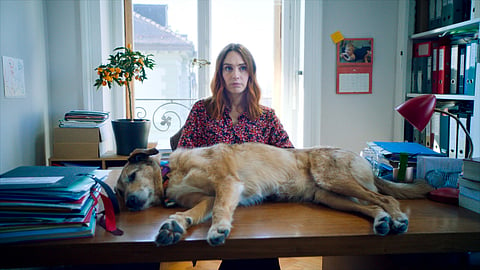

French-Swiss actress Laetitia Dosch’s directorial debut Dog on Trial, struck a chord not just because yours truly happens to be a dog lover, addicted to watching cute and emotional canine reels on Instagram but the human-animal conflict at its core is stuff of our contemporary urban Indian reality as well. Every morning I wake up to slanging matches on my neighbourhood WhatsApp group over the local strays, with the pro-lobby fighting for feeding and protecting them, and the anti-faction citing aggression and canine attacks as a reason to urgently relocate the street dogs.
Although set in Switzerland, Dosch’s film presents this evidently universal discord at its most absurd. Loosely inspired from a real life legal proceeding in France against a dog who had been repeatedly biting strangers, it has Dosch herself playing the lead, lawyer Avril Lucciani, who has a knack for taking up hopeless causes. While victory in a case remains elusive, a partially sighted client Dariuch Michovski (Francois Damiens) reaches out to her for defending his best friend and faithful companion, Cosmos (dog Kodi) whose life is at stake in the first canine trial since the middle ages. Avril has to rise up to the challenge or else Cosmos, having already bitten people three times, is liable to be put to sleep as per the country’s law. As Avril says in the film, “everyone was fascinated by the case but nobody knew what to think”.
The film played last year in the Un Certain Regard section of the Cannes Film Festival and won the coveted Palm Dog for the animal actor Kodi. It is indeed a terrific performance with Kodi traversing a gamut of emotions through the 80 odd minutes. He also keeps the film centred. His limpid, eloquent eyes, a turn of the head and eye rolls are enough to offer a precious perspective on the human farce surrounding him with his silence and loud barks holding more meaning than words.
The sense of human ludicrousness, however, is not spread smoothly and uniformly through the film. The tonal shifts—from the humorous to the heavy-handed—give a sense of unevenness to the texture and a hit and miss feel to the story-telling at large.
Apart from Avril and Cosmos the other characters don’t go beyond the sketchy or the stereotypical. Like Lorene (Anabela Moreira), the Portuguese cleaning lady bitten in the face by Cosmos. Her decision to keep and flaunt her scars rather than go for corrective surgery makes us want to know more. Her lawyer Rosaline (Anne Dorval), doesn’t rise above being a caricature of an opportunistic aspiring politician, fanning people’s fears for electoral gains.
At times too much seems to be happening on screen, the sense of chaos, in turn, also coming to inhabit the audience’s mind. A reason why the engagement with the goings-on on the screen stays inconsistent. It grips you at the start with its interesting premise to lose steam in the middle to again invoke intermittent curiosity towards the end.
The confusion basically has to do with many issues jostling for attention—from the legal system to environmental crises, from gender to animal rights. Most so the human insensitivity to other forms of life. There’s even a passing acknowledgment by Avril of the fear of the far right. And an interplay of the ideas of wilderness, freedom and domesticity when it comes to both women and dogs. All of this needed to be mapped out more distinctly and sharply in the script to have reached out and been impactful.
There are some significant takeaways. Like how Swiss law objectifies the dog as a thing, rather than an individual entity. Indicative of how even a loving human-dog relationship is ultimately about how the dog serves the human. What do we bring in here for them? Don’t we need to redefine a dog’s status in our universe? There’s the fundamental inability of humans to judge the dog despite bringing in religious leaders, psychiatrists and even translation machines to the court.
The casual misogyny Avril faces from her boss runs parallel with the absurdity of the charges of misogyny heaped on Cosmos but leave one befuddled than enlightened about the larger meaning. As does the parallel track of the physical abuse of Joachim, the child who lives next door to Avril. Then there’s Avril’s own sudden rage at the stranger in the traffic jam. Similar threads of violence that are not knit together in a satisfying pattern. Despite such density and weightiness of ideas, the hasty and confused execution make Dog On Trial a minor film when it could have been a lot more.